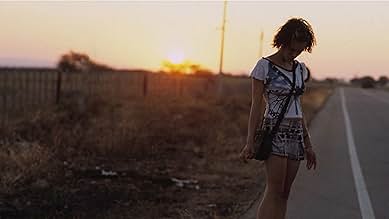IMDb-BEWERTUNG
7,1/10
2214
IHRE BEWERTUNG
Füge eine Handlung in deiner Sprache hinzuIn order to get funds, a young woman living in the Northeast of Brazil decides to raffle her own body.In order to get funds, a young woman living in the Northeast of Brazil decides to raffle her own body.In order to get funds, a young woman living in the Northeast of Brazil decides to raffle her own body.
- Auszeichnungen
- 28 Gewinne & 27 Nominierungen
Marcélia Cartaxo
- Marcelia
- (as Marcelia Cartaxo)
Handlung
WUSSTEST DU SCHON:
- WissenswertesThe title "Suely in the Sky" was partly based on the song "Lucy in the Sky with Diamonds" by the Beatles, and chosen just a few days prior to competition in the Venice Film Festival. The film was to be originally titled "Rifa-Me" ("Raffle Me").
- SoundtracksTudo Que Eu Tenho (Everything I Own)
Written by David Gates
Version by Rossini Pinto
Performed by Diana
Ausgewählte Rezension
"O Céu de Suely" follows Hermila (Hermila Guedes), a strong-willed and strong-faced young woman who leaves the big city of São Paulo with her infant son to return to her home town Iguatu, in the hot, arid hinterland of Ceará (Northeastern Brazil), where perennial blue skies never bring the rain. It's a poor village, but not the kind of desolate poverty of the peripheries and favelas of big Brazilian towns; life in Iguatu is simple, humble, uneventful, but unplagued by violence or famine. Hermila moves back into her grandmother's modest house, where her young aunt also lives (Hermila's parents are never mentioned). We learn that Hermila is impatiently waiting for Mateus, her companion (and the father of her child), to join her. Her baby's constant crying unnerves her: half- jokingly, she says she sometimes wishes she could leave him behind, "somewhere in the woods". Hermila's not evil or an uncaring mother -- she's just 21, eager, self-centered, she wants to have fun.
Life in Iguatu is boring. At night, she thinks of how much she's in love with Mateus and how she misses sex with him. While she waits, Hermila hangs out with Georgina, a young prostitute –- they both enjoy dancing, drinking, karaokeing, laughing, flirting, smoking pot. Hermila also meets biker João: they have casual sex, and though she's just having fun, he falls in love with her. Hermila soon realizes Mateus is never going to show up or send her money to help her raise their son. She's now on her own with her baby. She decides to leave Iguatu once again to a Southern city "as far as possible from Iguatu", but she can't afford the bus ticket. She raffles a bottle of whiskey, but the money she collects is insignificant. So she decides to raffle her own body for "a night in paradise" (as Sophia Loren did in DeSica's episode "La Riffa" in Boccaccio 70). She's excited by the idea and even comes up with a nom-de-guerre: Suely.
The raffle news runs fast: she becomes the talk of the town, physically confronted by neighbors, strangers and even her own grandmother (in one of the film's best scenes), who calls her a prostitute. Hermila/Suely hits back: "I'm no prostitute; prostitutes go with lots of men, I'll go with just ONE". She's naive; she doesn't know what she's doing is against the law. Even her open-minded aunt can't understand her; if Hermila's family is willing to help her and her baby, if João loves her and is ready to commit, what else does she want? Hermila doesn't know WHAT exactly, but she knows she wants more than quiet, uneventful survival. Is she going all the way with the raffle? Will she leave again? What about her family, her son, João?
4 years after his visceral (but irregular) "Madame Satã" set in 1930s Rio de Janeiro, Ceará-born director/co-writer Karim Aïnouz investigates in "Céu " a reality much closer to him: the back-land of Northeastern Brazil, where male migration is a century-long tradition due to the arid weather and poor soil; they migrate South looking for work and ways to send money back home. Women are used to living by themselves, doing menial jobs and running their homes and families (sisters, daughters, nieces, small children). Like in all small villages in all poor countries, migration is the magical promise of happiness, of a better fate, of CHANGE. The men you do see in Iguatu are just passing by in their bikes, trucks, cars -- the gas station is the place where local girls meet men in transit. In Iguatu, the skies are immobile and life stands still; the road is the only place where there's action.
Like Stablemate aptly said in his comment here, "Céu " is centered around acting (and mood) rather than narrative development or plot twists. And at its center is actress Hermila Guedes. Though little experienced, she gives one of the guttiest, nakedest (in every sense) performances in recent Brazilian cinema. Aïnouz is obviously fascinated with her strong face (there are close-ups of her eyes, mouth, teeth, hair, there's even a close-up of the skin behind her ear!), her magnificent, ample bosom and girlish hips and legs. The other actors deliver competently, with Zezita Mattos a standout as the grandmother. Walter Carvalho's camera-work is efficient as usual and serves the film completely; seldom have blue skies seemed so claustrophobic. The costume/hair design is spot-on, with Hermila-Suely's clothes gradually revealing more of her body, and her "big city" hairstyle becoming a symbol of her inadequacy in Iguatu. The soundtrack smartly alternates tacky Brazilian love songs with experimental electronic music.
In" Madame Satã", Aïnouz depicted a black gay swindler who used his nimble, powerful body to fight, dance, cross-dress, seduce, gain respect. Like "Satã", "Céu..." also focuses on a non-conformist, independent protagonist who uses the body to defy society and express personal freedom: freeing the body as a symbol of freeing and strengthening oneself. "Céu..." is a quietly rewarding film, certainly slow but powerful and coherent in its apparent uneventfulness. Recommended for attentive, patient viewers and for those who want to watch recent Brazilian films NOT dealing with urban violence and favelas.
Life in Iguatu is boring. At night, she thinks of how much she's in love with Mateus and how she misses sex with him. While she waits, Hermila hangs out with Georgina, a young prostitute –- they both enjoy dancing, drinking, karaokeing, laughing, flirting, smoking pot. Hermila also meets biker João: they have casual sex, and though she's just having fun, he falls in love with her. Hermila soon realizes Mateus is never going to show up or send her money to help her raise their son. She's now on her own with her baby. She decides to leave Iguatu once again to a Southern city "as far as possible from Iguatu", but she can't afford the bus ticket. She raffles a bottle of whiskey, but the money she collects is insignificant. So she decides to raffle her own body for "a night in paradise" (as Sophia Loren did in DeSica's episode "La Riffa" in Boccaccio 70). She's excited by the idea and even comes up with a nom-de-guerre: Suely.
The raffle news runs fast: she becomes the talk of the town, physically confronted by neighbors, strangers and even her own grandmother (in one of the film's best scenes), who calls her a prostitute. Hermila/Suely hits back: "I'm no prostitute; prostitutes go with lots of men, I'll go with just ONE". She's naive; she doesn't know what she's doing is against the law. Even her open-minded aunt can't understand her; if Hermila's family is willing to help her and her baby, if João loves her and is ready to commit, what else does she want? Hermila doesn't know WHAT exactly, but she knows she wants more than quiet, uneventful survival. Is she going all the way with the raffle? Will she leave again? What about her family, her son, João?
4 years after his visceral (but irregular) "Madame Satã" set in 1930s Rio de Janeiro, Ceará-born director/co-writer Karim Aïnouz investigates in "Céu " a reality much closer to him: the back-land of Northeastern Brazil, where male migration is a century-long tradition due to the arid weather and poor soil; they migrate South looking for work and ways to send money back home. Women are used to living by themselves, doing menial jobs and running their homes and families (sisters, daughters, nieces, small children). Like in all small villages in all poor countries, migration is the magical promise of happiness, of a better fate, of CHANGE. The men you do see in Iguatu are just passing by in their bikes, trucks, cars -- the gas station is the place where local girls meet men in transit. In Iguatu, the skies are immobile and life stands still; the road is the only place where there's action.
Like Stablemate aptly said in his comment here, "Céu " is centered around acting (and mood) rather than narrative development or plot twists. And at its center is actress Hermila Guedes. Though little experienced, she gives one of the guttiest, nakedest (in every sense) performances in recent Brazilian cinema. Aïnouz is obviously fascinated with her strong face (there are close-ups of her eyes, mouth, teeth, hair, there's even a close-up of the skin behind her ear!), her magnificent, ample bosom and girlish hips and legs. The other actors deliver competently, with Zezita Mattos a standout as the grandmother. Walter Carvalho's camera-work is efficient as usual and serves the film completely; seldom have blue skies seemed so claustrophobic. The costume/hair design is spot-on, with Hermila-Suely's clothes gradually revealing more of her body, and her "big city" hairstyle becoming a symbol of her inadequacy in Iguatu. The soundtrack smartly alternates tacky Brazilian love songs with experimental electronic music.
In" Madame Satã", Aïnouz depicted a black gay swindler who used his nimble, powerful body to fight, dance, cross-dress, seduce, gain respect. Like "Satã", "Céu..." also focuses on a non-conformist, independent protagonist who uses the body to defy society and express personal freedom: freeing the body as a symbol of freeing and strengthening oneself. "Céu..." is a quietly rewarding film, certainly slow but powerful and coherent in its apparent uneventfulness. Recommended for attentive, patient viewers and for those who want to watch recent Brazilian films NOT dealing with urban violence and favelas.
Top-Auswahl
Melde dich zum Bewerten an und greife auf die Watchlist für personalisierte Empfehlungen zu.
- How long is Love for Sale?Powered by Alexa
Details
- Erscheinungsdatum
- Herkunftsländer
- Offizieller Standort
- Sprache
- Auch bekannt als
- Love for Sale
- Drehorte
- Produktionsfirmen
- Weitere beteiligte Unternehmen bei IMDbPro anzeigen
Box Office
- Bruttoertrag in den USA und Kanada
- 13.703 $
- Eröffnungswochenende in den USA und in Kanada
- 3.058 $
- 19. Aug. 2007
- Weltweiter Bruttoertrag
- 13.703 $
- Laufzeit1 Stunde 30 Minuten
- Farbe
- Sound-Mix
- Seitenverhältnis
- 1.85 : 1
Zu dieser Seite beitragen
Bearbeitung vorschlagen oder fehlenden Inhalt hinzufügen

Oberste Lücke
By what name was Suely im Himmel (2006) officially released in India in English?
Antwort






















